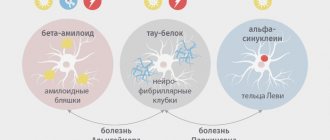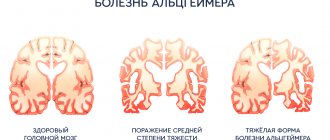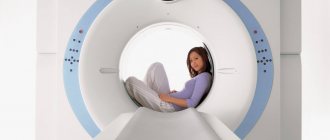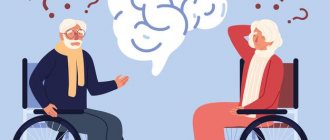Attention!
The information in the article is for reference only and cannot be used for self-diagnosis or self-medication. To decipher the test results, contact a specialist.
Previously, this condition was considered normal age-related changes that accompany the aging of the body. Now they are trying to identify it in patients as early as possible in order to slow down the process of neuron degradation with the help of drugs.
Alzheimer's disease - what is it?
Alzheimer's disease is a progressive form of senile dementia that leads to the loss of cognitive abilities. It belongs to the group of acquired neurodegenerative pathologies. The disease occurs more often in patients over 65 years of age. Forms that begin before 60 years of age are less commonly noted. The disease develops gradually and unnoticed.
The patient first develops short-term memory and attention disorders. Then the symptoms increase steadily. A person's attention, memory, and speech are severely impaired. The patient cannot develop new skills and reproduce old ones. His psychomotor coordination is impaired and his time orientation suffers.
The patient is disoriented in space, place and self. Identifies thought disorder. All pathological processes are caused by the destruction of brain cells. There are two types of Alzheimer's disease. The first is an early onset of the disease with the onset of clinical manifestations after 65 years, the second type with the onset of symptoms before 65 years.
The diagnosis is made based on the clinical picture after excluding diseases with a similar clinical picture. The diagnosis is confirmed posthumously during an autopsy. The number of neurofibrillary tangles and senile plaques is determined.
Treatment of dementia due to Alzheimer's disease
- Drug therapy (nootropics, cholinesterase inhibitors, vitamin therapy, antiparkinsonian drugs, vascular drugs, neurometabolites; limited use of tranquilizers and antipsychotics).
- Instructing relatives.
Treatment is prescribed only after confirmation of the diagnosis by a medical specialist.
Essential drugs
There are contraindications. Specialist consultation is required.
- Ipidacrine (anticholinesterase agent). Dosage regimen: orally, at an initial dose of 20 mg/day. (in two doses), then it is increased over 2-4 weeks. before therapeutic (40-80 mg/day in two doses). The duration of treatment is at least 3 months.
- Galantamine (anticholinesterase agent). Dosage regimen: orally, at an initial dose of 8 mg/day. (4 mg morning and evening) for 4 weeks. With good tolerance from the 5th week. the daily dose is increased to 16 mg (8 mg in the morning and evening). With insufficient effectiveness and good tolerability from the 9th week. treatment, the daily dose can be increased to 24 mg (12 mg in the morning and evening). Duration of treatment is at least 3-6 months.
- Memantine (neuroprotective agent). Dosage regimen: orally, at an initial dose of 5 mg (once in the morning), every 5 days the daily dosage is increased by 5 mg (in two doses) until the therapeutic dose is reached. The course of treatment is at least 3 months.
- Piracetam (nootropic drug). Dosage regimen: orally, with liquid at a dose of 400-800 mg in 3 divided doses.
- Cerebrolysin (nootropic drug). Dosage regimen: intravenously, at a dose of 20-30 ml of the drug in 100 ml of 0.9% sodium chloride solution, 20 infusions per course. A course of treatment with Cerebrolysin 1-2 times a year is recommended.
Stages
The course of the disease is divided into four phases, with a progressive clinical picture with cognitive and functional impairment. The following stages are distinguished:
- Predementia. The first manifestations of Alzheimer's disease are often similar to a reaction to stress or normal age-related changes. Changes in cognitive function are detected eight years before the advanced stage during neurocognitive testing. Problems begin with the inability to assimilate new information. Patients cannot concentrate. Planning suffers and cognitive flexibility is lacking. Abstract thinking is impaired, semantic memory is reduced.
- Early dementia. Progressive memory deterioration and impairment of all types of perception in Alzheimer's disease lead to confirmation of the diagnosis. Memory declines unevenly. Old memories of your life and long-learned facts are preserved. Recently learned facts are quickly forgotten. Speech disturbances appear. Defects in executive functions, motor disorders, and perception disorders occur. Vocabulary depletion occurs and speech fluency decreases. Clumsiness appears when using fine motor skills, and problems with coordination increase. The person is able to perform only simple tasks independently.
- Moderate dementia. Patients experience progressive deterioration of their condition. The possibility of independent action is reduced. Speech disorders become obvious, and the vocabulary is sharply depleted. The person misunderstands the meaning of the word. Reading and writing skills are lost. Coordination is impaired during complex sequential movements. The person cannot cope with most ordinary tasks. The patient does not recognize close relatives. Long-term memory deteriorates. Neuropsychiatric changes appear - irritability, wandering, emotional lability, spontaneous aggression.
- Severe dementia. At this stage of the disease, the patient is dependent on outside help. He uses single phrases and words when communicating. Then speech disappears completely. The reaction to emotional appeals to them remains. Sometimes episodes of aggression occur, which are replaced by apathy and exhaustion. Even the simplest actions are impossible without outside help. The patient's muscle mass decreases. He moves with difficulty, often unable to get out of bed.
Death occurs from associated causes - pressure ulcers, pneumonia and other diseases.
Signs of the last stage of Alzheimer's
The last stage of Alzheimer's disease is characterized by complete degradation of personality, the patient can no longer care for himself, reflexes are impaired, he cannot swallow food, and loses speech. The last stage of the disease confines a person to bed - the patient cannot raise his head, stops smiling, there is increased muscle tone, and the person experiences severe pain. This stage of the disease ends in death.
At the last stage of Alzheimer's disease, the patient needs help with everything - he cannot use the toilet on his own, there is urinary incontinence, he may have trouble finding his way around the apartment. At the last stage of the disease, the use of adult diapers and round-the-clock supervision of the patient are required. In most cases, the patient's relatives find a caregiver or place him in a boarding school or boarding house for patients with dementia. Medical documents (examination results, expert opinions) for placement in a boarding house or boarding school can be prepared by a specialist from the Yusupov Hospital.
Living with such a patient becomes a very difficult test for relatives. The patient behaves inappropriately, may be aggressive, hit, scream, refuse food or hygiene procedures. During the severe stages of Alzheimer's disease, a lot of time is required to care for the sick person. Often, family members who have a patient with dementia suffer from depression and experience chronic stress.
Specialists at the Yusupov Hospital help the patient’s relatives - they are assisted by a psychologist, and qualified hospital staff teach how to care for the patient. In the hospital you can undergo rehabilitation activities and receive timely medical care. Make an appointment with a neurologist by phone. After the examination, the doctor will prescribe the necessary diagnostic methods and select the optimal therapy.
Causes
A single factor responsible for the occurrence of Alzheimer's disease has not been identified. It is believed that there is a hereditary predisposition to the disease. Several hypotheses for the formation of changes in the brain are now being put forward:
- Cholinergic. Cognitive deficits are associated with decreased production of the neurotransmitter acetylcholine. The theory is considered outdated, but it is not completely abandoned.
- Amyloid. The main factor in the development of changes in the brain in Alzheimer's disease is considered to be the deposition of beta-amyloid protein in its tissues. A mitochondrial DNA defect is found in half of the patients. The gene encoding its formation is located on chromosome 21. The early onset of the disease is associated with defects in the PSEN1, APP, and PSEN2 genes. Beta-amyloid plaques appear in the brain, slowing down the speed of cognitive reactions. This hypothesis is recognized as the main one. Amyloid accumulation sets off a chain of neurodegenerative disorders.
- Tau hypothesis. It is believed that a cascade of pathological changes initiates a deviation in the structure of the tau protein. In it, hyperphosphorylated threads are connected. Neurofibrillary tangles are formed in neurons. Then the disintegration of microtubules occurs. The transport system in cells is destroyed. This disrupts the signal transmission system between neurons.
- Infectious. It is believed that the development of the disease is associated with the causative agent of periodontitis. Colonization of brain tissue by bacteria occurs, which increases the production of beta-amyloid.
Researchers note that high sugar consumption accelerates the development of cognitive impairment. This worsens the course of the disease.
Symptoms
The initial signs of change are almost noticeable. Manifestations of the disease develop gradually and slowly, they are as follows:
- the patient has difficulty remembering recent events;
- there are emotional disorders;
- poor recognition of famous objects;
- higher cortical functions are disrupted;
- decreased ability to navigate in space;
- depression;
- indifference;
- anxiety.
Subsequently, the patient's cognitive impairment increases. He is incapable of making decisions. Mathematical operations are difficult to complete, making it difficult to count money. Speech becomes incoherent. Long pauses appear, which are associated with a long selection of words. The late stage of the disease is characterized by the following clinical picture:
- rave;
- failure to recognize loved ones;
- hallucinations;
- convulsions;
- shuffling gait;
- loss of ability to move independently;
- personality degradation;
- disturbance of orientation in place and time;
- lack of opportunities for mental activity.
In severe dementia, the patient is completely dependent on others. He can't serve himself. Acquired skills disappear, articulate speech is lost. Aggression alternates with apathy and exhaustion.
Diagnostics
If a disease is suspected, patients consult a psychotherapist or neurologist. The doctor examines the patient and studies his medical history. Talks with the patient and his relatives. The main criterion for diagnosis is the presence of decreased memory and cognitive abilities. Additional research methods are prescribed:
- CT and MRI of the brain;
- cerebrospinal fluid analysis for beta-amyloid protein;
- NuroPro test;
- genetic testing;
- determining the level of amyloid beta in the blood;
- positron emission tomography.
The patient is given tests to determine cognitive abilities - digital, Sage test, watch image.
Treatment
To date, no treatment has been found to stop the development of Alzheimer's disease. There are medications that slow the progression of symptoms. These include the following drugs:
- NMDA antagonists;
- cholinesterase inhibitors;
- beta-secretase inhibitor.
To relieve symptoms, antipsychotics and drugs that increase cerebral circulation are prescribed. A low-calorie diet enriched with protein is prescribed. It is recommended to reduce the amount of sugar and salt. You need to eat fatty fish, foods high in B vitamins, selenium, and zinc.
Psychotherapeutic support plays an important role in improving the patient’s well-being. It is important for the patient to avoid stressful situations and stay in comfortable conditions. He needs to create a positive emotional mood.
How to reduce the risk of developing Alzheimer's disease?
1. Exercise your brain
Mental activity helps reduce the risk of Alzheimer's disease by strengthening connections between brain cells and stimulating their growth.
Commit yourself to the idea of continuous learning, learn new skills and start hobbies
.
A good way to stay mentally active is to read and write, do crosswords and puzzles, attend lectures and go to the theatre. Even watching TV can be beneficial if you watch it to learn something interesting and not just while away the time in front of the screen. 2. Feed your brain right
Research shows that a healthy diet can significantly reduce the risk of Alzheimer's disease.
First of all, avoid foods containing saturated fat and “bad” cholesterol. Be sure to include fresh fruits and vegetables in your diet. Give preference to red peppers, broccoli, spinach, oranges, grapes, cherries and other berries. These foods contain large amounts of antioxidants, which protect brain cells from free radical damage. Another mandatory menu item is foods high in Omega-3 fatty acids, which protect cell membranes: fatty sea fish, green leafy vegetables, nuts, vegetable oils. Vitamins B12, C, E and folic acid also help support brain health. 3. Move
.
Physical activity is a good way to reduce your risk of Alzheimer's disease. Try to move regularly
.
Moderate systematic exercise is suitable. Cardio training improves blood flow to the brain, increases endurance and normalizes body weight. In addition, they reduce blood cholesterol levels, increase tissue sensitivity to insulin and reduce the likelihood of cardiovascular diseases, which affect the state of the brain. Start walking, cycling, swimming or skiing regularly. Try to devote at least half an hour a day
.










